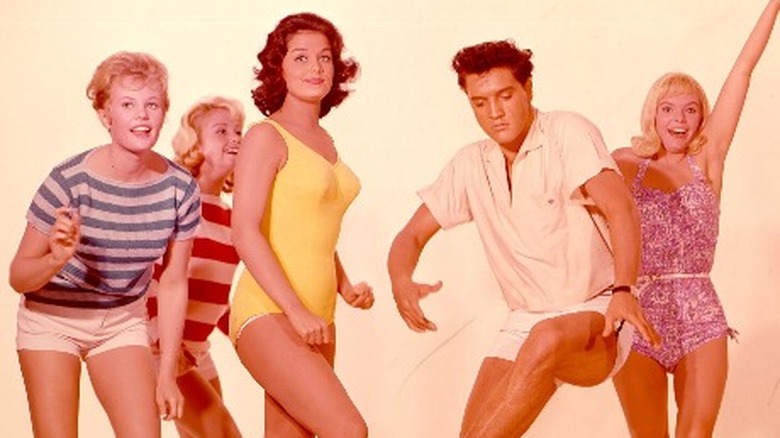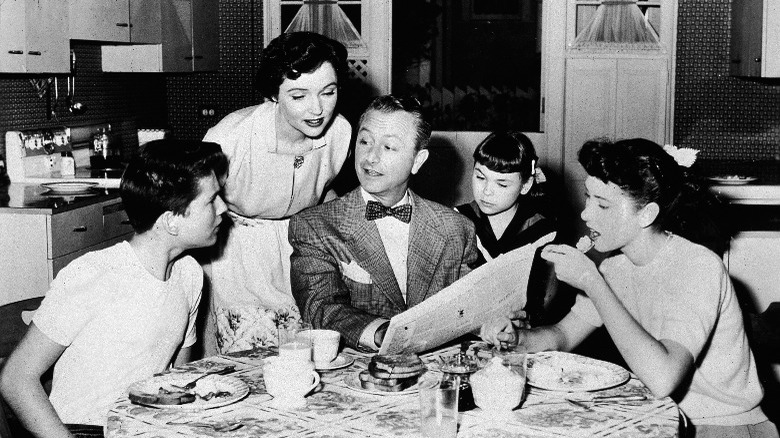The Tragic Murder Of Jenny Maxwell Explained
While the name Jenny Maxwell may not ring a bell now, in the early 1960s, she was one of Hollywood's biggest up-and-coming stars. She appeared on many TV shows and acted in movies opposite the likes of Elvis Presley and Jimmy Stewart. Twenty years later, she was found shot to death in the lobby of her condo building, with her soon-to-be-ex-husband dying nearby. How did she go from star to victim?
That was exactly what her cousin, Buddy Moorehouse, wanted to know when he began investigating her murder in 2019. He found secrets that had been buried in the files of the LAPD for nearly 40 years. Moorehouse wrote in The Livingston Post that the truth had been there all along, obscured by a Los Angeles Times piece on the murders that stated they were part of a robbery gone awry. That story had been repeated in every subsequent book and website about Maxwell, but Moorehouse discovered something very different.
Jenny's early life and career
Jenny Maxwell was born in Brooklyn, N.Y., on September 3, 1941, according to Los Angeles Magazine. Her parents were Norwegian immigrants; their family name was originally Myksvoll. Maxwell's father Jonas was the younger brother of Moorehouse's grandfather, Elling (via The Livingston Post). Moorehouse's mother Vera Cunningham was close with her cousin Jenny despite being six years older. Cunningham, who later became a theater teacher and community performer, encouraged Maxwell's interest in acting (via The Detroit Free Press). It was Cunningham's desire to know her cousin's fate that sparked Moorehouse's search.
According to Moorehouse in The Livingston Post, Maxwell was discovered by director Vincente Minelli in an acting class in Brooklyn in 1958. He wanted her to test for an upcoming Frank Sinatra film, "Some Came Running." Though Maxwell didn't get that part, she immediately got some TV roles, including on "Father Knows Best." Her career peaked in 1960-61: she was named a Hollywood Deb Star and appeared on "The Bob Hope Buick Hour." She was in the movie "Take Her, She's Mine" with Stewart and Sandra Dee, and she starred with Presley in "Blue Hawaii," her most famous role (pictured above, far right).
Jenny's later life
Though Maxwell's career was blossoming, her private life was rocky. At only 17, she had married Paul Rapp, an assistant director for "Father Knows Best" (cast pictured above). At 19, she had a son, Brian Rapp. When she and Rapp divorced a couple of years later, she won custody of Brian, but later lost it because of her lifestyle: she was deep into partying, drinking, and drugs (via Los Angeles Magazine).
In the late 1960s, she decided to pull herself together. She quit acting to focus on her son. In 1970, she married divorce attorney Ervin "Tip" Roeder, who was more than 20 years older than her. Moorehouse says (via The Livingston Post) she married him for his money, and he married her because she was young, attractive, and a former star. Unfortunately, this marriage was tumultuous, too, with constant arguments and cheating on both sides. By 1981, after several attempts, she finally left him, buying a condo and moving out. On June 10, she and Roeder were both killed.
Buddy Moorehouse gets involved
In 1981, Moorehouse was a senior at the University of Michigan. His mother called him that June, distraught because a cousin in Norway had called to tell her Maxwell had been murdered. They didn't know why.
Moorehouse was a sports writer for the university's newspaper, The Michigan Daily, and decided to use his journalistic skills to investigate the incident. From his newspaper's office, he called the Los Angeles Times and asked to speak to someone in their library, where archives were kept. He asked the woman he ended up talking to if they'd done a story on the Roeder murders; they had, so the woman read it to him over the phone. The story didn't mention Maxwell's career or maiden name. It included the often-repeated theory that the murder was part of an attempted robbery.
The family didn't believe that story, but for the next several decades, they knew nothing more. In 2019, with his mother in failing health, Moorehouse decided to look into her beloved cousin's murder once again (via The Livingston Post).
The investigation continues
According to his Livingston Post story, Moorehouse began by getting all the information he could about Maxwell from his mother, uncle, and cousins. He got in touch with one of Maxwell's best friends, as well as the first police officer to arrive at the murder scene, but neither knew exactly what had happened. Eventually, he called the LAPD, and an officer there went through some old, non-digitized files until he found the names of the detectives who'd investigated the case. One was still alive: Mike Thies.
When Moorehouse got in touch with Thies, he got some surprising but welcome news: The murder had been mostly solved back in 1981. Moorehouse flew to LA, where Thies took him to the scene of the crime and told him everything he knew. While he was there, Moorehouse decided to visit his cousin, Brian Rapp; they bonded over conversations about Maxwell.
Moorehouse was ultimately able to tell his mother, just before her death, the truth about Maxwell. Meanwhile, he decided to write a book about his findings. He wrote it in novelistic style, but based on the facts, and self-published it in 2021. "Murder of an Elvis Girl: Solving the Jenny Maxwell Case" reached number 62 on Amazon's biographies list (via The Detroit Free Press).
The LAPD's theory
Moorehouse says in The Livingston Post that his family immediately thought in 1981 that the murder might have been a mob hit. Tip Roeder was a former cop and knew lots of shady characters.
The LA detectives' theory wasn't terribly different. The Roeders were in the midst of a bitter divorce, and the detectives suspected he had hired a hitman to kill Maxwell so he could avoid paying her alimony. On the day of the murder, Roeder had driven her back to her condo after she had a minor surgery. The detectives thought he had ordered the hitman to shoot both of them, to make it look like Roeder himself had nothing to do with it. Unfortunately for him, the hitman ended up killing him, too (via Los Angeles Magazine).
The robbery theory didn't add up, according to the detectives. Nothing had been stolen from Maxwell, and some of the rare type of ammunition used to kill them was found in Roeder's car. The police were never able to locate a suspect, so the case was never officially solved, but to Thies, there was no mystery about what had happened. He was certain his theory was correct (via Los Angeles Magazine). Now, the story is finally out there in Moorehouse's book, for anyone to read.





